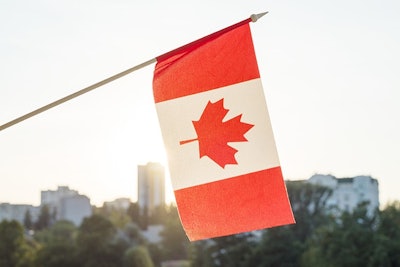
Canada celebrated a historic milestone this week when its legal adult-use cannabis market opened Oct. 17. In the days that followed, government-run corporations in each province began overseeing product distribution. While some warned of product shortages and a lack of retail outlets, Canada’s cannabis legalization represents a monumental leap forward in cannabis policy reform that some hope will help accelerate reform efforts in the United States.
“Legalization officially going into effect in Canada is a major step for cannabis, its consumers and human rights as a whole,” said Jeffrey M. Zucker, co-founder and president of cannabis business strategy firm Green Lion Partners. “As the largest country to legalize thus far, Canada has the opportunity to set an example for nations around the world.”
“We’ve been watching Canada’s evolution for several years and while [this] is certainly a milestone, it is really just the next logical step on their journey to end cannabis prohibition,” added Mark Grindeland, co-founder and CEO of Coda Signature, a producer of cannabis edibles, topicals and oils.
Already, Canadian licensed producer The Green Organic Dutchman (TGOD) has seen tremendous product demand through online and retail sales, with dispensary lines spilling into the streets of Kamloops, Calgary, Winnipeg and Nova Scotia, according to Vice President Danny Brody. In Ontario, the province’s online store averaged more than 100 orders per minute and crashed intermittently throughout the first day of sales, he added.
“For TGOD, legalization brings increased brand awareness as consumers explore various strains, products and brands,” Brody said. “Today's consumers care about what they put in their bodies, and many consumers are looking to our company to find certified organic products. We're looking forward to supplying the recreational market in the first half of next year.”
With Canada serving as an example, some are hopeful that the U.S. might be the next country to end federal prohibition.
“In the U.S., we have seen the benefits of legalization in terms of increased access for consumers, job creation and tax revenue,” Grindeland said. “We’ve also seen declines in crime and opioid addictions. We’ve experienced the challenges of state vs. national legalization and we are very interested to see how it unfolds nationally in Canada. We are hoping it accelerates progress here in the United States.”
“As an American, I am disappointed that the federal government's ignorance has pushed us to miss out on many of the opportunities and investment dollars on which Canada is capitalizing,” Zucker said.
The disconnect between cannabis’s federally illegal status and the states that have legalized the drug has caused complications and confusion for the U.S. industry. According to Derek Riedle, the publisher of Civilized, Canada has an opportunity to show its southern neighbor that legalization can be done.
“Canadian legalization will be an inspiration and an incentive,” he said. “Having a successful adult-use recreational market right next door will make it more and more difficult for American prohibitionists to defend their stance.”
“Canada’s sensible new law will show the world that a fully legal cannabis industry is not only something that can be responsibly implemented and regulated, but is something that can tremendously benefit the country and its citizens,” added Erik Knutson, CEO of Keef Brands, a producer of cannabis-infused beverages and edibles. “We hope the world’s leaders and policy makers, especially those in the U.S., take heed of Canada’s new approach to cannabis and see how beneficial it would be to replicate a similar approach in their own countries.”
In the meantime, Canadian companies continue to seek investment opportunities, a trend that will likely grow with a regulated market in Canada.
“Canada companies see U.S. operators as the early veterans of the industry. They will look to invest in their institutional knowledge they have in the short term, as well as their U.S. licenses, which will be a cash cow in the long term, once federal legislation evolves to allow worldwide cannabis distribution,” said Dustin Iannotti, co-founder of marketing agency Artisans on Fire. “Canada gets knowledge and groundwork laid out for future expansion, and the U.S. gets a partner that is learning the ropes of a whole new foreign market. I think long term, this is a win-win situation for operators on both sides of the border.”
Top Image: © Valerii Honcharuk | Adobe Stock


























